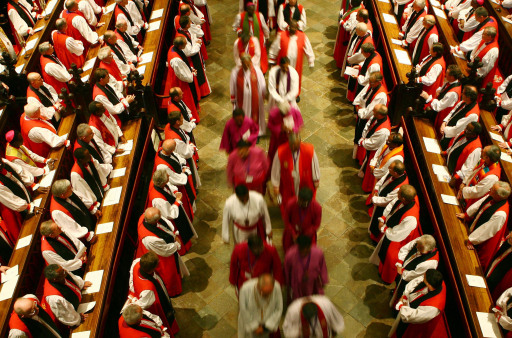New church attendance figures – do the numbers add up?

I don't mean that in some way the actual numbers themselves are dubious. There is no reason to doubt the accuracy of the statistics that have been compiled.
Nor do I necessarily mean the spin that is being put upon them – though there are some legitimate questions to be asked about that. No, what I have in mind is something rather more basic than that.
The latest figures, published by the Archbishops' Council, suggest that, nationally, average weekly attendance in Anglican churches fell by 0.3 per cent to 1,091,484 in the year 2011. On the other hand, there was significant growth in attendance at Christmas services. In 2011, 2,618,030 people were in church over the festive season – a rise of 14.5 per cent on 2010. Early returns from 2012 suggest a further increase last Christmas.
The Bishop of Norwich, Graham James, says the overall fall of 0.3 per cent represents "a stabilising trend" and that in total the figures demonstrate a "quiet confidence". There are certainly some questions to be asked about this sort of interpretation: I doubt that the Chancellor of the Exchequer, George Osborne, would describe a 0.3 per cent contraction in the economy as a "stabilising trend", for example!
But, be that as it may, it seems to me there are some rather more basic questions we should be asking about the language that is being used.
First of all, is it even legitimate to speak of "church" as something we "attend"? The clear impression this gives – whether it is the media or bishops using such phraseology – is that church is a building and that it is something people can come along to if and when they are able to and feel like it, for whatever reason. Well, people are of course always welcome (we hope!). But – as even the most basic study of the New Testament makes clear – church is not a building. Any one church – and the church more generally – is a living, organic community of people, rather than a construction of bricks.
And therefore, secondly, as I have never tired in telling the congregations I have served, church is not something we "attend" – church is what we are. Rightly understood, then, to speak of "attending" a church is as misconceived as talking of a goal-keeper "attending" a football team, a bee "attending" a hive or (to use the Biblical imagery) as a hand or foot deciding to "attend" its body – as opposed to being an integral part. A church is a body, a group of people, who – inevitably – meet together regularly because they are disciples of Christ. People may quite rightly find out more by coming along occasionally – but "attending services" is not New Testament language.
My worry about using the language of "attendance" is that it simply perpetuates popular myths and misrepresentation about what church is. Moreover, numbers are a far from accurate predicator of spiritual health: Jesus was followed by "a large crowd" we are told in John 6 – most of whom, as he himself goes on to say, were tagging along for all sorts of mixed up reasons. When he explains something of his identity in a little more depth, we are told that many "turned back and no longer went about with him," (v66). It is hard to see him describing this as a "stabilising trend" or anything similar!
For Jesus, the vocabulary of following him revolves not around statistics, or attendance – but around whole-life discipleship.











